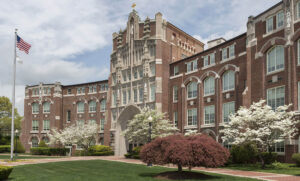by The Cowl Editor on February 8, 2018
Editorial Statements

by Gabrielle Bianco ’21
Opinion Staff
Is college serving America’s needs? This question served as the prompt for two commentary pieces in the Providence Journal regarding the role of colleges today. The two pieces took contrasting views.
The first, written by Michael S. Roth, president of Wesleyan University argued that the college institutions are worth fighting for, as they provide students with the chance to be exposed to a variety of perspectives and educate students to impact the world around them.
The other article, written by Teresa Mull, a research fellow in education policy at The Heartland Institute, argued that colleges are becoming corrupt as they create a homogeny of liberal thought and pointed out the fact that while society stresses the need to go to college, it might not be the best option for everyone.
Students are left to contemplate where they fit into this debate. The answer is not black and white, but rather calls into question how knowledge is spread and the role of colleges in society.
The college years serve as a golden window of opportunity to be exposed to not only a wide variety of classes, but a variety of perspectives. For many students, going to college is the first time they have lived away from home and have the opportunity to live with and meet people they have not grown up with.
This melding of perspectives can be invaluable as students prepare to go out into a diverse and ever-changing world. Early exposure to different people can create a more sympathetic and accepting tomorrow. For this reason alone, colleges prove to be a worthy asset to society.
That being said, colleges have shown a trend in prioritizing liberal views. These partisan biases have been called into question as the animosity between political parties has heightened in recent years. According to Mull’s article, 58 percent of Republicans believe that colleges have a negative effect on the nation while 72 percent of Democrats believe the opposite. This divide is dangerous.
People involved at all levels of education must take action to ensure that dialogue is facilitated in ways in which people are free to speak out for what they believe without disparaging others with a different viewpoint.
In addition to raising questions about the imbalanced distribution of perspective in universities, the articles raise an interesting question regarding how society makes the college experience seem like the only option after high school graduation. While this notion may be widespread, it is far from true.
As Mull pointed out in her article, there are many instances in which a trade school or some other form of education may be a better course of action after graduating high school.
Likewise, the importance of learning through life experience must not be disregarded in favor of textbooks. A gap year before college is one way in which students can gain more experience about the world and themselves.
Jack Murphy ’20 decided to take a gap year before beginning his time at Providence College. He said, “Coming out of high school, I was pretty sheltered and unmotivated. I hadn’t gotten to know many people that weren’t like me, and I also had no idea what I wanted to do with my life. I ended up taking a gap year and spending nine months teaching in Paraguay…Taking time off from school was a really influential time for me to reconsider what was really important to me and how I want to live the rest of my life.”
Colleges are an integral part of society. The unique opportunity they have to merge and educate students from many backgrounds and educate is essential to progress.
However, colleges must check themselves to ensure that they are nurturing free inquiry to the best of their abilities. While colleges are of great importance, they are not the best option for every high school graduate and should not be considered the only course of action.
As the College enters its second century of education, it is essential that we stick to our mission of “academic excellence in pursuit of the truth, growth in virtue, and service of God and neighbor.”